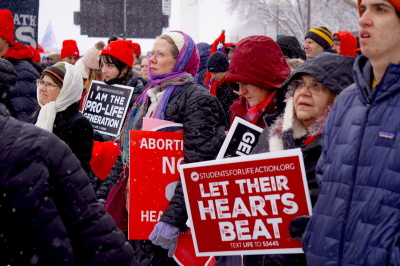What does it even mean to be pro-life in 2025?

Ronald Reagan set aside January as Sanctity of Human Life Month in the 1980s to affirm the value and dignity of all human life, particularly focusing on the unborn. This month coincides with the anniversary of the Supreme Court's Roe v. Wade decision in 1973, which legalized abortion nationwide. In his proclamation, Reagan called attention to the moral and societal importance of protecting the most vulnerable among us and urged Americans to reflect on the sanctity of life.
This month, we celebrate the monumental victories for life, including the overturning of Roe v. Wade, a historic milestone that has saved countless lives. As significant as this triumph is, it is not the end of our journey. Instead, it begs an essential question: What does it indeed mean to be pro-life?
The challenges we face in our post-Roe world remind us that our work is far from complete. Recent losses in Missouri and Colorado — two states where legislation shifted against pro-life principles — serve as sobering examples. These setbacks reveal that the pro-life movement cannot rely on legislative successes alone. While laws are critical, they are insufficient to win the hearts and minds of a culture increasingly resistant to life-affirming values. The reversal of Roe marked a pivotal milestone, yet it also exposed the pressing need for profound cultural and spiritual renewal.
Adoption must be elevated by the pro-life movement. According to CDC data, less than 1% of women aged 18-44 have ever placed a child for adoption, while according to the Guttmacher Institute, 1 out of 4 women in the USA have had an abortion. This Sanctity of Human Life Month, we must begin the work of reversing these statistics for the sake of women and their children. Circumstantial data collected by NBC News suggests that adoption agencies nationwide have seen various effects since the Dobbs decision. The majority surveyed, however, saw a slight increase in adoption interest.
Adoption embodies a life-affirming alternative that allows both mother and child not only to survive but to thrive. For every expectant mother facing an unplanned pregnancy, adoption offers hope for a future for her child and healing for herself. Unfortunately, misconceptions persist. To counter falsehoods, we must amplify the true message that adoption is a profound act of love and sacrifice that deserves greater support from communities, churches, and policymakers. With increased advocacy and support for mothers in crisis pregnancies, choosing life through adoption becomes more attainable.
At the heart of the pro-life movement lies a truth that transcends legislation and constitutional amendments. Being pro-life is not merely about opposing abortion; it is about valuing the inherent dignity of every human life. If we believe as a pro-life community that each life is inherently valuable, this means protecting all life from conception to natural death. This means supporting women in unplanned pregnancies with compassion and resources that empower them to choose life. If our ultimate goal is to build a culture that values and protects life, we must engage in the hard work of changing hearts and minds through education, empathy, and tangible acts of love.
This is a call to support vulnerable children, women, and families, champion adoption as a viable alternative, and provide a safety net for those who feel they have no options. It is a challenge to each of us to examine our own lives: Are we living out pro-life values in word and deed? Are we continuing to advocate for life in our communities or merely celebrating past victories?
As we prepare our hearts to observe Sanctity of Human Life Month, let us honor its significance by recommitting ourselves to the cause. Celebrate the victories, yes, but also take tangible steps forward. Support adoption agencies, volunteer at pregnancy resource centers, mentor young parents, or simply have conversations that affirm the value of all life. Together, we can build a culture that cherishes life in all its forms — one that transforms not only laws but also lives. That is the hopeful vision we must carry forward: a world where every life is seen, valued, and loved.
Herbie Newell is the President of Lifeline Children’s Services, the largest Evangelical Christian adoption agency in the United States. The organization serves vulnerable children and families through private domestic and international adoption, family restoration, and pregnancy counseling. Herbie is also the author of Image Bearers: Shifting from Pro-Birth to Pro-Life.





















